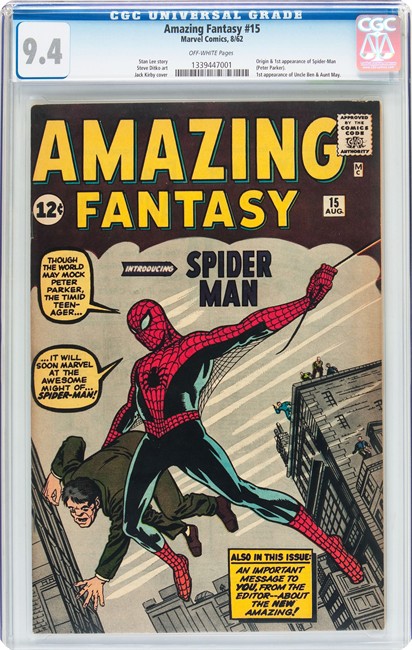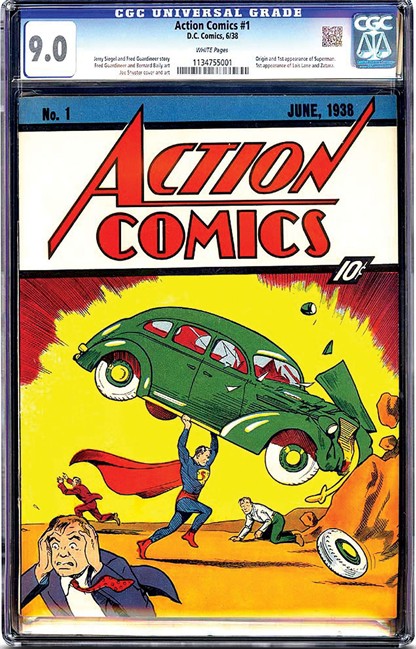Once considered a niche market, comic book culture is just about everywhere you look these days.

So it may surprise you to learn that the vast majority of comic books are actually illegal in Canada.
No, this is not some HYDRA plot (at least, that we’re aware of), but instead a little-known provision in the Criminal Code of Canada dating back to the 1940s.
“Section 163, 1b of the Criminal Code of Canada makes it a crime to possess, print, publish, or sell a crime comic if you are possessing that comic for the purposes of sale,” Bob Tarantino, a media and entertainment lawyer at Dentons law firm in Toronto, tells Global News.
A “crime comic” in this case is, according to the criminal code, any magazine or periodical which depicts either the commission of a crime, or the events connected with the commission of a crime, before or after.
READ MORE: ‘Captain America: Civil War’ review: Superhero blockbuster delivers the action
So if you’re thinking that would encompass the latest issue of Spider-Man, Batman, or any other superhero – you’d be right.
“The letter of the law is drafted sufficiently broadly so that virtually any superhero comic book that we’re familiar with today would violate the letter of the law,” Tarantino said.

The law originated in the late 1940s, during a very different time for the comic book industry and popular culture in general. While characters like Superman, Batman, and Captain America had already made their debuts, superheroes didn’t dominate the comics field the way they do today.Instead, the comics industry was primarily driven by pulp crime, horror, and romance stories – and their reach as an entertainment medium was considerable.
“So what you have to remember about this is that at the time, comic books were really being purchased by young children and teenagers as an almost normal part of their entertainment consumption,” Tarantino said. “So we’re talking about hundreds of thousands of, not millions of copies being purchased every single year for about 15 years.”

Get breaking National news
Around this time a backlash began against the perceived crime and violence depicted in comic books. This issue came to a head in Canada in November of 1948, when two boys, playing the role of highway bandits, shot and killed a man in northern British Columbia seemingly at random. When it was found that the two were voracious readers of crime comics, a push began to legislate against the comic book industry. This effort was spearheaded by E. Davie Fulton, the Member of Parliament for Kamloops, B.C. The eventual legislation banning the sale of crime comics was eventually named “Fulton’s Bill.”
So just how much time are you looking at for selling a comic, anyways?
“If they did choose to pursue as an indictable offence, the maximum sentence a court can impose is two years imprisonment,” Tarantino said.
Jules Greco, an employee at the Silver Snail, one of the largest comic book retailers in Toronto, says the law is outdated.

She’s not kidding: the last time charges were laid under the crime comics law was in 1987, against a Calgary-based comic retailer. Even in that case, the charges were eventually changed to distribution of sexually explicit materiel.
Still, needless to say, she was a little surprised to find out her job involved selling contraband that could land her in jail.
“Is this job worth two years in jail?,” Greco said. “Hmmm…I don’t think so. I’m sorry. I’m sorry Snail people!”
READ MORE: ‘Batman v Superman’ earnings plummet 68 per cent in second weekend
Saturday, May 7 is Free Comic Book day, where most major comic book publishers will be offering free samples of their work to entice readers to get into upcoming storylines or new characters.
It’s also an important day for brick-and-mortal comic retailers like the Silver Snail.
“Free Comic Book day is really important,” Greco said. “It gives us a chance to introduce readers to new comics, comics they haven’t read before.”
Of course, there is the minor concern that this entire event is, in the eyes of Canadian law, a massive giveaway of contraband material.
So should retailers (to say nothing of comic book fans) be concerned about the law cracking down on them?
“I suspect if you called the police and tried to report the sale of a crime comic, they’d likely laugh at you and hang up,” Bob Tarantino said.
“If the government really wanted to take action, they should just get rid of the law,” Greco added. “Because it’s silly, and kind of outdated.”


Comments